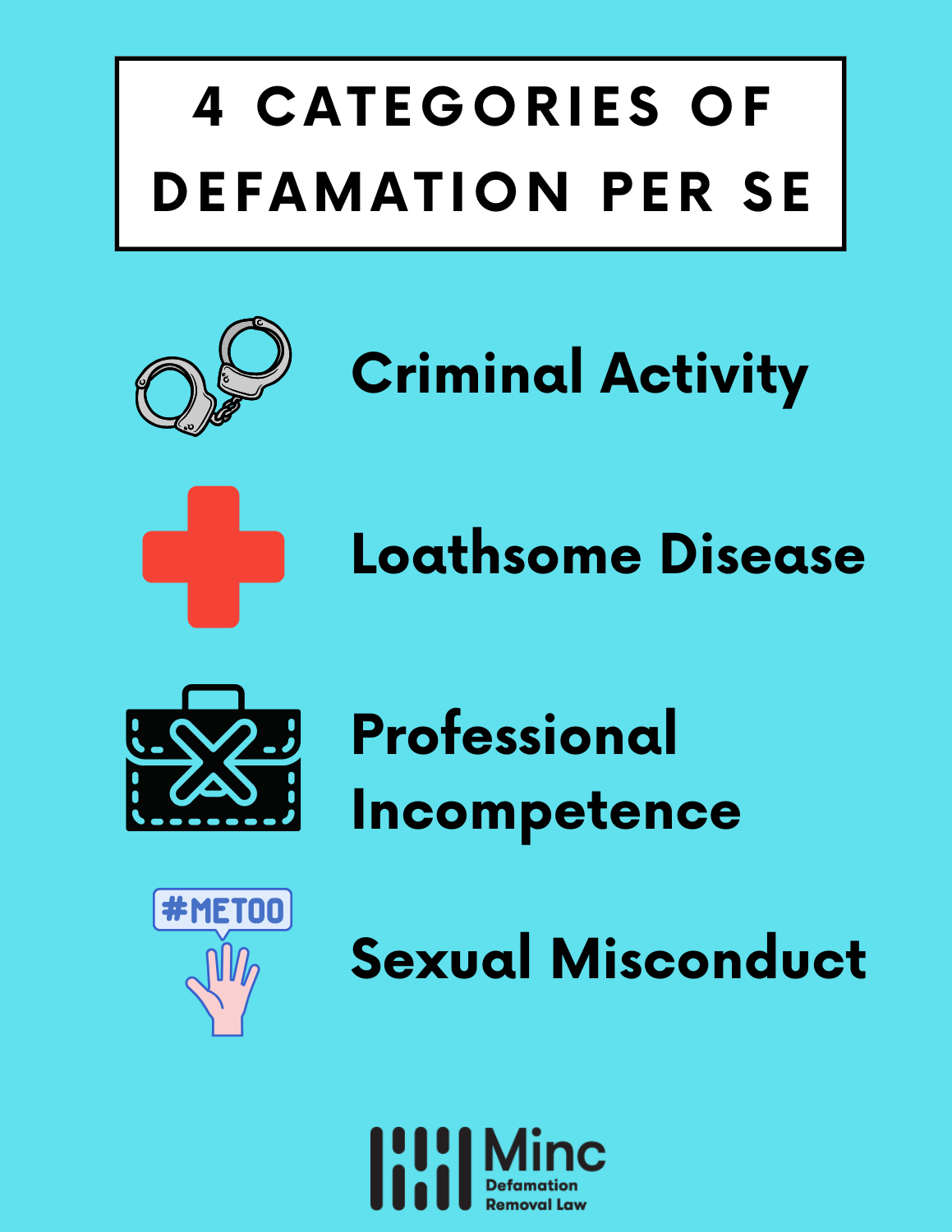
- Originally Published on May 9, 2025
What Is Defamation Per Se?
Defamation per se refers to statements that are so inherently damaging to a person’s reputation that they are presumed harmful without requiring proof of actual damages. This legal concept creates an important distinction in defamation law that can significantly impact how cases proceed and what plaintiffs must prove to succeed in their claims.
Understanding Defamation Basics
Defamation occurs when someone makes a false statement about another person that harms their reputation. The legal system recognizes two forms of defamation: libel (written defamatory statements) and slander (spoken defamatory statements). In standard defamation cases, plaintiffs must prove several elements to succeed in their claim.
To establish a defamation claim, a plaintiff typically needs to demonstrate that:
- A false statement was made about them
- The statement was published or communicated to a third party
- The defendant acted with at least negligence
- The plaintiff suffered actual damages as a result
The requirement to prove actual damages often presents a significant challenge for defamation plaintiffs. Quantifying the precise financial impact of reputational harm can be difficult, especially when the effects manifest in subtle ways. This is where the doctrine of defamation per se becomes particularly important.
Defamation Per Se vs. Defamation Per Quod
Defamation law distinguishes between defamation per se and defamation per quod. Defamation per se applies to statements that are defamatory on their face, without requiring additional context or explanation to understand their defamatory nature. In contrast, defamation per quod refers to statements that are not inherently defamatory but become so when considered alongside additional facts or context.
This distinction is crucial because it affects what a plaintiff must prove to succeed in their claim. In cases of defamation per quod, the plaintiff bears the significant burden of proving that they suffered actual, legally recognizable harm as a direct result of the defamatory statement. However, in cases of defamation per se, the law presumes that damage to reputation has occurred, relieving the plaintiff of this burden.
Categories of Defamation Per Se
While specific definitions may vary somewhat by jurisdiction, statements generally considered defamation per se fall into four traditional categories:
- First, statements falsely accusing someone of committing a crime involving moral turpitude or dishonesty typically qualify as defamation per se. These include false accusations of fraud, theft, assault, or other criminal acts that would tend to lower a person in the estimation of their community.
- Second, false statements implying that someone has a loathsome disease have historically been considered defamation per se. Though the application of this category has evolved with changing social attitudes toward illness, certain false health-related claims may still qualify.
- Third, statements that injure someone in their profession, trade, or business represent another important category. This includes false claims that directly attack a person’s professional competence, integrity, or business practices. For example, falsely stating that a professional is incompetent or engages in unethical practices would likely constitute defamation per se because such statements directly undermine the individual’s ability to earn a livelihood.
- Fourth, statements implying sexual misconduct or lack of chastity traditionally qualify as defamation per se. False accusations regarding sexual behavior or impropriety typically fall within this classification. Despite evolving social norms regarding sexuality, courts continue to recognize the serious reputational harm that can result from false statements in this domain.

The Legal Presumption of Harm
The primary advantage of pursuing a defamation per se claim lies in the presumption of damages. When a statement qualifies as defamation per se, the plaintiff is relieved of the burden of proving specific financial losses resulting from the defamatory statement. This presumption acknowledges that certain types of false statements are so inherently harmful to reputation that damage can be assumed to have occurred.
This legal presumption creates several significant advantages for plaintiffs. The case can proceed more efficiently without the need for extensive documentation and testimony regarding specific financial impacts. The focus instead remains on establishing the falsity of the statement, its publication, and the requisite level of fault by the defendant.
In cases involving actual malice, where the defendant knew the statement was false or showed reckless disregard for its truth or falsity, plaintiffs in defamation per se cases may also have increased potential for punitive or exemplary damages. These additional damages serve not only to compensate the plaintiff but also to deter particularly egregious defamatory conduct.
Elements of a Defamation Per Se Claim
To succeed in a defamation per se claim, a plaintiff must still establish several key elements. First, they must prove that the defendant made a false statement about them. Truth remains an absolute defense to any defamation claim, including defamation per se. If a defendant can prove that the allegedly defamatory statement is substantially true, the claim will fail regardless of how harmful the statement might be.
Second, the plaintiff must demonstrate that the statement was published or communicated to at least one third party. Defamation requires that someone other than the plaintiff and defendant received the communication.
Third, the plaintiff must establish that the defendant acted with the requisite level of fault. For private individuals, this typically means proving that the defendant acted negligently in making or publishing the false statement. For public figures, a higher standard applies. They must prove that the defendant acted with “actual malice,” meaning knowledge of falsity or reckless disregard for the truth.
Finally, the plaintiff must show that the statement falls within one of the recognized categories of defamation per se. This classification is what triggers the presumption of damages that distinguishes defamation per se from other defamation claims.
Damages in Defamation Per Se Cases
The presumption of harm in defamation per se cases affects the types of damages available to plaintiffs. In traditional defamation cases, plaintiffs must prove actual damages, which are specific financial losses directly attributable to the defamatory statement. This might include lost business opportunities, diminished earning capacity, or other quantifiable harms.
In defamation per se cases, however, plaintiffs may be entitled to presumed damages without specific proof of financial loss. These damages acknowledge the inherent harm to reputation caused by certain types of false statements. Courts recognize that damage to reputation may not always manifest in ways that can be precisely quantified but is nonetheless real and deserving of compensation.
In addition to presumed damages, plaintiffs in defamation per se cases may also seek nominal damages, which are a small sum that acknowledges the violation of the plaintiff’s rights even in the absence of significant harm. In cases involving particularly egregious conduct, punitive or exemplary damages may also be available to punish the defendant and deter similar behavior in the future.
Defenses to Defamation Per Se Claims
Even when a statement falls into a per se category, defendants have several potential defenses available. Understanding these defenses is crucial for both potential plaintiffs and defendants in defamation cases.
Truth remains an absolute defense to any defamation claim, including defamation per se. If a defendant can prove that the allegedly defamatory statement is substantially true, the claim will fail regardless of how harmful the statement might be. This reflects the fundamental principle that defamation law protects against false statements, not merely harmful ones.
Statements of opinion rather than fact may also be protected from defamation claims. The distinction between fact and opinion can be nuanced, but generally, statements that cannot be proven true or false or that clearly represent the speaker’s subjective viewpoint may qualify as protected opinion. However, this defense has limitations. Statements couched as opinions that imply undisclosed defamatory facts may still be actionable.
Various forms of privilege can also provide protection against defamation claims. Absolute privilege applies to certain contexts, such as statements made during legislative proceedings, judicial proceedings, or by high-ranking government officials performing their duties. Qualified privilege may apply to statements made in good faith in certain contexts, such as employer references or reports to law enforcement.
Public figure status creates additional hurdles in defamation cases, including those involving defamation per se. Under established legal standards, public figures must prove that defamatory statements were made with “actual malice,” which means knowledge of falsity or reckless disregard for the truth. This higher standard reflects the recognition that public figures voluntarily expose themselves to increased scrutiny and have greater access to platforms for countering false claims.
Next Steps
If you are a victim of a false and defamatory statement and are considering legal action, you should speak with a qualified internet defamation attorney to discuss your options for addressing the harm you have suffered. An experienced attorney can help you understand what you will need to prove to prevail on a potential claim. Whether your situation involves defamation per se or defamation per quod, there are avenues for pursuing your claim and obtaining meaningful remedies for the damage caused.
The Internet Defamation Team at Minc Law has extensive experience handling all forms of defamation claims across the United States. We have successfully represented clients in hundreds of defamation per se cases and understand the nuances of this area of law.
Contact us at (216) 373-7706 or by using the form below for a consultation to discuss your options and determine the best path forward for your specific situation.
Get Your Free Case Review
Fill out the form below, and our team will review your information to discuss the best options for your situation.
This page has been peer-reviewed, fact-checked, and edited by qualified attorneys to ensure substantive accuracy and coverage.